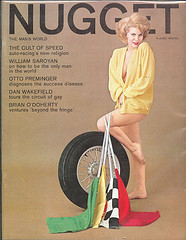Three Things: Erasing, Erased, Erasure
[NB: check the byline, thanks! /~Rayne]
There are so many more than three different items under this theme, I could write a book about this. But in the interest of time and resources, I’ll opt for simplicity.
You are being erased if you haven’t been already.
~ 3 ~
Writer and former business consultant Anand Giridharadas shared an excerpt yesterday from a financial adviser’s newsletter to clients.
Someone leaked me an amazing document about how spooked Wall Street types are by @ewarren.Gather round. https://t.co/imAh7YiPes
— Anand Giridharadas (@AnandWrites) October 8, 2019
Transcript:
[…] I just got a great leak that I want to share with you from someone’s financial adviser. You may have a financial adviser. This is a financial adviser trying to advise people what would happen to America if Elizabeth Warren was elected president. And by the way I think a lot of this would apply to Bernie Sanders if he was elected president as well. I think there’s a similarity. And so what would a Warren presidency do to markets. I just want to read some of this to you because it really is hilarious obviously in a way that these boring people did not intend.
And um, so they say, “We have been getting increasing inquiries to address the potential market of her policies as she has gained a lot of momentum over the last couple of weeks.”
And um, it says, “To be clear we do not get involved in political opinions.” To be clear. “So we did a surface level dive on her platform,” they say, “and our intention is to understand the market implications,” they say, and I quote, “Many of these policies are designed specifically to reduce corporate profits and earnings, and instead use those funds to benefit number one workers, number two the environment, number three those with lower incomes, and number four,” oh gosh,”women and minorities. It is important to understand that Warren’s policy goal is to reduce the retained earnings of businesses across multiple sectors and to benefit other parties as mentioned above. As such it is very reasonable statement that if Warren were elected and those policies were enacted it would likely be negative for the stock market because stock prices are an expectation of future earnings.” And so on and so forth.
“The policies would hurt corporate earnings universally,” it says, “although they would likely improve quality of life for many demographics at the expense of corporate profits. Whether that trade-off is positive or negative is not our place to say.” People, stocks, which is better? We don’t know. “We are simply focused on facts. Again, we do not get involved in political opinions,” it said. So now they break it down in case this is not obvious enough, good for people, bad for, for uh, stocks, in case that’s not obvious enough they break it down by policies. Let’s just go through that, shall we? Is that okay? You got time? I got time. I’m in a hoodie.
“Number one ban fracking. Warren wants to ban fracking for oil and gas based on environmental concerns.” Now they do a nice thing where they do who’s this negative for, who’s this positive for, super helpful. “Negative for energy companies and indices, positive for the price of oil/gasoline, supply would be reduced.” Uh, that’s interesting.
“Policy number two eliminate private prisons. Warren wants to end federal contracts to private prisons and withhold funding to make state and local governments do the same. Materially negative for private prison stocks,” ooh, that would be rough for them, yeah.
“Reinstate Glass-Steagall. Warren wants to reinstate the law that separated commercial banking and investment banking. Negative for the major investment banks — JPM, MS, BAC, GS, et cetera, as they would likely have to spin off retail banking operations.
Policy number four, increase taxes on the wealthy. Warren is advocating an ultra-millionaire tax on the 75,000 richest families in the U.S. along with other tax increases aimed at high earners. This could reduce disposable income. Negative for consumer discretionary retail sectors and lingerie stocks. She wants to double the national minimum wage,” they say, “from $7.25 to $15.00. Negative for the entire stock market, the entire stock market,” well, then maybe some more people would be able to buy stocks. “And small business margins. This would significantly compress corporate margins across industries and would result in a reduction of expected earnings for the S&P 500. Those negative effects would be some partially offset,” it goes on, “by more disposable income from minimum wage earners.
“Number six, Warren supports the Family Act, which would create paid national family and medical leave for up to 12 weeks. Negative for small businesses. For large corporations, not much of an impact.” Uh, you know, there we go.
“Number seven agribusiness, breaking up agribusiness.” In fact maybe even break up the word agribusiness into two separate words, agri and business. “Most of the country’s and world’s meat and agriculture production is concentrated in a few major companies. Warren wants to break up these vertically integrated agriculture and food companies. Negative for the agriculture sector, companies in the ag stocks as well as pesticide producers.” And so on and so on.
“The bottom line from a market standpoint is that these policies will be negative for stocks with some being downright negative for the broad markets. How negative would they be for stocks? No one knows exactly.” But this is where it gets interesting. “Again, this doesn’t mean these policies don’t have winners. These are policies designed to reduce retained corporate earnings in favor of other things Warren and her supporters deem more important. So voters will decide if they want to support that type of trade-off. Everyone has their hierarchy of what’s important.”
This is where it gets, we’re getting into Kant here, this is philosophy here in a financial advisor’s report. You gotta pay extra to get to this paragraph. “Everyone has their hierarchy of what’s important, and Warren is an unapologetic populist, who if in power would enact policies designed to reduce corporate earnings to benefit other stakeholders,” parentheses, “workers, the environment, et cetera.” So, I think like all people and the planet are (air quotes) other stakeholders.
“Regardless of your opinion of that strategy it is important to understand that investment accounts would likely be negatively affected under these policies, and if they become reality, we need to take steps to mitigate that damage. As we move closer to the election we’ll obviously be keeping close watch on the implications of the Democratic primary giving you market intelligence on what the headlines mean for stocks going forward.”
They also want to reiterate that this is not political.
It boggles the mind to think that workers, the environment, women and minorities are just sucking drains on the audience for which this opinion piece was written.
We’re roughly 75% of citizens and the entire natural physical world but we’re just an inconvenience drawing down on corporate profits.
We’re not 75% of human beings who’ve been driven over roughshod, had our labor stolen from us for compensation less than subsistence, and the steadily destroyed environment which all of us share and in which we live.
How easily we are erased from consideration by the plutarchy.
One upside: now we know with certainty the financial industry views Warren as both a serious contender for the Democratic nomination and a threat.
Downside: we know, too, that in spite of their B-school education the financial industry is still as dumb as a box of rocks, likely to trash the entire economy and the planet, because they can’t see outside of the rut they’ve been in forever, where only white men have capital and make economies. They are incapable of seeing the untapped promise for stock market growth and saving our planet, locked within more than two decades of stagnant wages, monopsonic job markets, and millennia of toxic colonization.
Note how health care wasn’t at all mentioned; the financial sector is incapable of seeing the benefits to the broader markets if businesses were freed of the burden of health insurance shopping and premium payments.
~ 2 ~
In 1986 I worked for a small machining business. My boss was a bigoted lecher, I’ll be frank. It wasn’t unexpected when he told me if I got pregnant while I worked for him he’d fire me. Fortunately having kids wasn’t yet in the cards for me and I could afford to ignore his misogyny though I couldn’t afford to quit.
In 1988 I applied for a job with a business that did custom manufacturing. I was offered the job but turned it down because their health insurance didn’t cover women’s reproductive care or maternity coverage and they didn’t expect to offer it any time soon, especially since I’d be only one of two women on staff. I took a job with a Fortune 100 company instead; their plan had women’s reproductive care and maternity coverage.
In 1989 my supervisor at that same employer told my older female co-worker he had a limited amount of money to offer his department staff of 10, two of which were male. “I have to give the boys raises because they have families to support.” Never mind that this older woman had teenagers at home, or that the rest of us junior female staff members assisted these two male staffers, or that we might have wanted families we couldn’t yet afford.
In 1993 I got pregnant the month the company fired my supervisor’s equally misogynist boss. I swear the egg waited to drop until I had a new female department head. She was understanding and considerate even though she’d never had any kids of her own.
In 1997 after three years in a new department, I became pregnant with my second child. My boss was itchy and weird throughout my pregnancy, increasingly so over time. You’d think a lawyer would know better than to ask every week during my seventh and eighth month when I was due and was I going to go on leave soon. I had to go to HR to ask for an intervention; I left a week before my scheduled delivery.
It’s not just my own experience; my sister ran into friction from her Fortune 500 employer while she was pregnant. Thankfully she had support from both HR and her union — just not the men she worked with. I can’t tell you how many female friends have likewise been harassed at work for being pregnant.
Don’t get me started about simple systemic problems. Ever tried to sit in one of these for several hours while eight months pregnant?

When Elizabeth Warren said she was fired when her pregnancy became visible, I believed her. I am furious with news media outlets for entertaining the idea this was ever not true, or that this isn’t a continuing problem today.
[Let’s not forget the outlet which propelled the attack on Warren was the same one which was tasked with the original Trump dossier — Washington Free Beacon. Are they using material from a Warren dossier?
Let’s not forget, too, that outlets like CBS which continued to poke at Warren have had a wretched history of treating women poorly — or has everyone already forgotten Les Moonves and his nasty habits, including blackballing Janet Jackson for a wardrobe malfunction?]
Think back upon your education and work experience; how many times during K-12 education do you recall seeing a pregnant teacher? I never did any time between 1965 and 1978, and more than 85% of the teachers I saw were female, most of childbearing age. I don’t recall seeing a pregnant instructor during college at all.
How many times did you see a pregnant woman in the workplace? I didn’t until I was in my 30s and having kids myself.
And now my daughter has to put up with crap regarding reproductive health coverage, more than 30 years after I had to turn down a job for not having it as part of their benefits. Why has this not changed for the better? Why is it worse because our government has now butted into the mix to make it worse rather than ensuring we all get the health care we need regardless of gender?
Why is the essential human fact that women need reproductive care or maternity coverage still something we must fight for against the plutocratic patriarchy which wants to deny it and erase us?
~ 1 ~
There’s a theory that stingy millennials are to blame for the sluggish economy, said financial news network CNBC, parroting investment firm Raymond James.
Are you fucking kidding me?
When 40% of Americans can’t muster $400 cash for an emergency, it’s not stinginess that they aren’t stimulating the economy.
When the reason so many Americans are strapped is because of debt, it’s not stinginess.
When 45 million American students and parents hold educational debt amounting to ~$1.5 trillion — more than what Americans owe on their credit cards or auto loans — it’s not stinginess.
When minimum wage workers across the entire country can’t afford rent on 2-bedroom apartment, it’s not stinginess.
When 25% of Americans ages 18-64 report having problems paying medical bills, it’s not stinginess.
Somehow the financial sector including media dedicated to covering it have erased all the other reasons why millennials — Americans born between 1981-1996 (23-38 years old) — might not be able to fully participate in stimulating the economy.
Conveniently, the several hundred uber wealthy families represented at the far right of the interactive graphic in the tweet below don’t worry at all about erasure.
Watch how radically taxes on the wealthy have fallen over the past 70 years:
(Full column: https://t.co/XP0a4Iljti) pic.twitter.com/dGxmOjQ1b5
— David Leonhardt (@DLeonhardt) October 7, 2019
They own the erasers.
~ 0 ~
This is an open thread.



